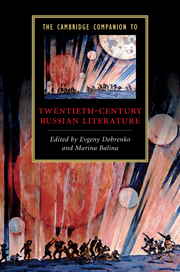Book contents
- Frontmatter
- 1 Poetry of the Silver Age
- 2 Prose between Symbolism and Realism
- 3 Poetry of the Revolution
- 4 Prose of the Revolution
- 5 Utopia and the Novel after the Revolution
- 6 Socialist Realism
- 7 Poetry after 1930
- 8 Russian Epic Novels of the Soviet Period
- 9 Prose after Stalin
- 10 Post-Soviet Literature between Realism and Postmodernism
- 11 Exile and Russian Literature
- 12 Drama and Theatre
- 13 Literature and Film
- 14 Literary Policies and Institutions
- 15 Russian Critical Theory
- Index
8 - Russian Epic Novels of the Soviet Period
Published online by Cambridge University Press: 28 May 2011
- Frontmatter
- 1 Poetry of the Silver Age
- 2 Prose between Symbolism and Realism
- 3 Poetry of the Revolution
- 4 Prose of the Revolution
- 5 Utopia and the Novel after the Revolution
- 6 Socialist Realism
- 7 Poetry after 1930
- 8 Russian Epic Novels of the Soviet Period
- 9 Prose after Stalin
- 10 Post-Soviet Literature between Realism and Postmodernism
- 11 Exile and Russian Literature
- 12 Drama and Theatre
- 13 Literature and Film
- 14 Literary Policies and Institutions
- 15 Russian Critical Theory
- Index
Summary
During the Soviet period the epic as a genre was at the forefront of attention for many writers producing long novels, especially if the subject involved military combat. In Soviet literature, two related but distinct versions of epic were most germane. The first was the classical tradition, particular features of which were appropriated for ideological purposes and for the cause of national aggrandizement. The second was the specific model of the epic novel to be found in Tolstoy’s War and Peace (1865–1869), itself an official model for Soviet literature. A complication here is that Tolstoy’s novel is indebted to the classical epic (as his own diary entries attest), yet its Second Epilogue takes issue with certain fundamental assumptions of the ‘epic’ view of history.
A similar ambiguity can be seen in the work of the four writers I will discuss here. Each of them produced epic novels which both challenge, and draw on, the kind of ‘epic’ exemplified by canonical Socialist Realism, and also both challenge and draw on the reworking of the epic tradition in War and Peace. I am treating in particular: Mikhail Sholokhov’s Quiet Flows the Don (Tikhii Don, 1928–1940); Boris Pasternak’s Doctor Zhivago (Doktor Zhivago, 1957); Alexander Solzhenitsyn’s Cancer Ward (Rakovyi korpus, 1968), The First Circle (V kruge pervom, 1969), and August 1914 (Avgust chetyrnadtsatogo, 1989); and Vasilii Grossman’s For A Just Cause (Za pravoe delo, 1952) and its sequel Life and Fate (Zhizn´ i sud´ba, 1960/1980).
- Type
- Chapter
- Information
- The Cambridge Companion to Twentieth-Century Russian Literature , pp. 135 - 152Publisher: Cambridge University PressPrint publication year: 2011
- 1
- Cited by

